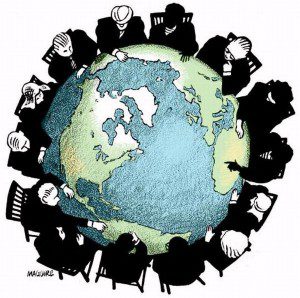| Online: | |
| Visits: | |
| Stories: |

| Story Views | |
| Now: | |
| Last Hour: | |
| Last 24 Hours: | |
| Total: | |
Institutional Thinking: Understanding the Mental and National States of War
Contributing Writer for Wake Up World
Perhaps it’s human nature to form collectives. Our collectives have grown over time from tribal to national. And our collectives have morphed to include entities which are not human or natural at all.
The idea that corporations are equal entitiesamong national collectives of individuals is not natural and is not human, certainly not pro-human. In fact one has to shed both common sense and human decency to even consider lending institutions the rights of individuals and inviting them, as equals and friends, into any collective.
In order to understand anything it is important to boil it down, as if a math problem, and consider the lowest common denominators.

Institutions United?
Institutions are not individuals. Institutions can exist for hundreds or thousands of years. They do not need clean air, water and food. They do not need companionship. Institutions are not your friends. They are simply mechanizations. Institutions in the world today seek unlimited growth and to prevent losses.
Institutions take on a certain life of their own, but are only characterizations created by individuals. They are tools of, for, and by people – and normally only a select few people. Institutions are normally oligarchical to one extent or another. An oligarchy is a pyramid system where ‘the few’ are in control of ‘the many’; the steeper the slant, the more oligarchical the institution.
The U.S.A. was founded on flattening the oligarchical world. “Life, liberty and the pursuit of happiness” for all. But now, with the build-up of the military industrial complex, the private prison system and a slew of institutions that benefit the few at the cost of the many, the U.S.A. is just another oligarchical nation among many. Perhaps no other recent legislation in the U.S.A. so spurs oligarchical collectivism as the Supreme Court decision on Citizen’s United.
In this case, the Court’s decision basically allows unlimited spending for political campaign advertising under the guise of the First Amendment. However the First Amendment of the Bill of Rights was written to bestow rights on individuals, by limiting what institutions were allowed to do – and not the other way around. The law enables oligarchical collectivism by allowing for very few wealthy people to fund entire election campaigns instead of many contributors from the community.
If the Supreme Court interpreted the Bill of Rights as it was written for individuals, they would have kept the spending cap. The Bill of Rights was not meant to expand the rights of institutions. It describes the rights of individuals, especially the First Amendment. In fact the First Amendment describes acts which only flesh and blood humans can do. The First Amendment describes rights of individuals which can, when used correctly, defeat oligarchical collectivism, ensuring a level playing field. But when those rights are applied to institutions, the oligarchy is bolstered, further empowering those already in power.
In this one Supreme Court decision, we can see how governments essentially promote or prohibit, and that the things they promote and prohibit shape the formation of the nation. And through this decision, we can see that our governments have forgotten that their role is to regulate commerce and protect individuals, not protect commerce and regulate individuals. The Supreme Court decision on Citizen’s United is part of a new global paradigm; lending the rights of man to machines. It is part of the global tendency to disproportionately value institutionalization rather than individuation.
Today, most nations promote and prepare for war, pouring their resources into war machines and and reinforcing institutional thinking – which in turn prohibits peace and individuation. War is totally anti-individual. The notion that militarism builds individual character is not true. Physical training builds character; increased learning and experience builds character; brotherhood builds character; war kills individuals for collective ambitions.
The U.S.A. is without doubt the biggest war country in the world now. It’s economy depends on being in a constant state of war. In peace individuals can devote time and energy to their surroundings and themselves. In war, institutions and collective thinking become the focus. The war mentality encourages separation, not oneness. It is built on a narrative of “us” versus “them”.
Four Mental and National States
If one boils down the idea that government institutions promote and prohibit, there are essentially four types of States in the discussion of war and peace.
Previous articles by Ethan:
- Saṃsāra and Nirvana – the Ultimate Duality
- We Have Sustainable Energy Technology – the Problem is the Oligarchy
- Why Governments Promote Deadly Nuclear Energy and Ban Beneficial Hemp
- Open Letter to Barack Obama: a Call to End the Disastrous Nuclear Era
- The 5 Tibetan Rites of Rejuvenation: 108 Movements to a Meditative Mind State
- How to Enhance Intuition: Understanding the Four Forms of Awareness
- A Little Green Revolution: the Rainbow Warriors will Heal the Earth Mother
- Hate: The Ultimate Social Control Mechanism
- UK’s Proposed Ban on Esoteric Knowledge: Why Institutions Seek to Limit Access to Information
- Presence and Mindfulness: the Meditative Value of 108
- Is Nuclear Experimentation Fascism?
- The Great Unsaid: What 1984 Can Teach Us About 2014
- The Brotherhood of Man: a Tibetan Perspective
- Oligarchical Collectivism and the Four Steps to Learning Politics
- Meditation and Intuition in the Fourth Age of Deception (the Kali Yuga)
Follow Wake Up World On…
[FACEBOOK]: http://www.facebook.com/joinwakeupworld
[PINTEREST]: http://pinterest.com/wakeupword/
[TWITTER]: http://twitter.com/joinwakeupworld
[YOUTUBE]: http://www.youtube.com/joinwakeupworld
[GOOGLE PLUS]: https://plus.google.com/112452105795129310867/posts
[WEBSITE]: http://wakeup-world.com



